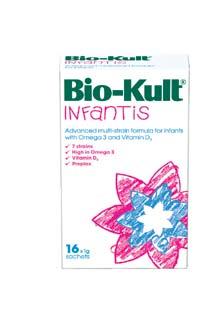
8 minute read
Probiotics
ProBiotiCS And the infAnt gut
Dr Mayur r Joshi Medical advisor, probiotics international ltd (protexin)
Advertisement
for article references please email info@ networkhealth group.co.uk
dr mayur Joshi is medical Advisor for the human health Care division at Probiotics international ltd (Protexin), manufacturers of Bio-Kult and lepicol. dr Joshi is a fully registered doctor and has spent most of his clinical work in colorectal surgery, before spending time within industry as a medical Advisor.
the human gut bacterial population (or microflora/microbiota) is a complex ecosystem that plays a critical role in many physiological functions within the body.
Its influence on early development and its subsequent impact on long-term health into adulthood has recently become a focus of much attention within probiotic circles. The gut flora has been shown to have an important role to play in infant nutrition, immune system development, behavioural development and the development of chronic conditions such as obesity, diabetes and other metabolic disorders.
In this article, we will discuss the importance of the infant gut microflora in health and disease, discuss how we can influence the function of the microflora using probiotics and look at some of the clinical evidence available to support their use in maintenance of health and prevention and treatment of disease.
infant GUt Microflora Up to 1,000 bacterial species inhabit the adult bowel, with concentrations increasing further down the intestinal tract.1 There are approximately 10 times more microbial cells inhabiting the body than there are cells making up the human body itself2; with the mass of bacterial cells within the colon weighing up to 1.5kg, similar in weight to the human liver.3 In addition, the collective genetic information of the gut bacteria (the microbiome or microbiota), contains over 100 times the number of genes in the human genome.4 Consequently, the metabolic function of this microbial ‘organ’ is comparable to the liver and, as such, is as important to normal functioning.
In utero, the foetus is presumed to be almost sterile, with little to no microbial colonisation. The mode of delivery is an important factor in the exposure of the body to microorganisms, with a natural vaginal delivery being the most desirable.
When the foetus is born via the vaginal canal, the bacterial exposure is representative of the microbes present in the mother’s vagina, a rich and diverse ecosystem; when the foetus is born via caesarean section, the bacterial exposure is representative of the mother’s skin and is less diverse.5 The differences between these exposures can have a significant impact on infant development as a more diverse microflora is associated with more beneficial effects.6,7 An early example of this difference can be seen in the evidence that suggests that up to 80% of MRSA infections in infants occur following a C-section birth.8
Epidemiologic evidence has shown a correlation between caesarean birth and obesity, asthma, coeliac disease and Type 1 diabetes.9 In addition, breastfeeding is associated with a lower risk of obesity, diabetes and diarrhoeal diseases. When analysed further, these correlations seem to be as a result of differences between the respective microbiomes that result after vaginal and caesarean deliveries.
Whilst there is no definition of a ‘normal’ gut bacterial population, there are indications of the types of bacteria that dominate in infant bowel and it takes approximately three years for the infant microbiota to mature into a more adult type. In that time, the infant
microbiota has profound influences on many physiological functions, in particular immune system development.
Microflora anD the iMMUne systeM The human gastrointestinal tract contains the largest mass of immune tissue in the body; in fact, gut-associated lymphoid tissue (GALT) is responsible for 60% of antibody secretion in the body.10 The microflora of the gut has a complex relationship with the immune system and is able to exert local and systemic effects.11
The importance of the microflora to our immune system is considered so significant that it has been postulated that we are 200,000 times more prone to infection without our microbiota.12 The intestinal microflora plays an integral part in host defence, both through direct interactions with pathogenic organisms as well as modulation of the immune system. Particularly in early life, the composition of the gut flora profoundly influences the development of the gut lining and the corresponding immune system, supporting it to work effectively and offer protection against common infections.
After birth, the microbial population of the gut ‘primes’ the local immune tissue which in turn has systemic effects on overall immune development. The mechanisms by which this occurs are very complex and are the focus of much ongoing research.
The hygiene hypothesis proposed by Strachan in 1989 suggests that the increase in the prevalence of atopic disease and autoimmune disease is related to reduced exposure to microbes at an early age as a result of improved sanitation and living conditions, vaccines, antibiotic therapy and smaller family sizes (in developed countries).13 These changes result in less diverse microbial populations resulting in altered microbiomes and immature immune system development. This in turn is associated with an increased incidence of allergic diseases (such as eczema, asthma and hay fever), autoimmune disease and increased susceptibility to infection.
proBiotics Probiotics represent a potentially excellent aid to early infant development. The accepted definition of a probiotic is a live microorganism that, when administered in adequate amounts, confers a health benefit on the host.14 These beneficial microbes can be used to support the bowel microflora and exert their beneficial protective effects. The mechanisms by which probiotics work are numerous and complex, but can broadly be categorised into three main functions as I have summarised in Figure 1.
Even in the brief summary Figure 1 it is clear to see that the functions of probiotics and their relationship with the human body are extremely complex. In addition, the nature of probiotics means that they are also extremely difficult to study in vivo. This is why randomised controlled trials remain the gold standard for probiotic research.
clinical eviDence Gut related disorders The use of probiotics to help prevent and manage diarrhoeal diseases in children is well established with much good research published in the area. There have been excellent trials that have demonstrated the benefits of specific probiotics in preventing nosocomial gastroenteritis, acute infectious diarrhoea, antibiotic associated diarrhoea and traveller’s diarrhoea.15
In addition, the use of specific probiotic formulations to help manage and prevent functional constipation is also well documented.16, 17
There has also been promising research in the use of probiotics in the prevention and management of infantile colic. One systematic review identified six excellent clinical trials that have shown benefit with the use of probiotics in colic.18 These studies are in single strain formulations, but a more recent study looked at the benefits of a multi-strain mixture and found excellent results in the management of colic with treatment success seen after only seven days of use.19
immune system related disorders An extensive meta-analysis of data available for the use of probiotic supplementation in reducing risk of developing atopic dermatitis (AD, also known as eczema) in children was performed in 2012.20 This was able to show that the use of probiotics significantly reduced the occurrence of atopic dermatitis (AD), particularly in children administered with probiotics perinatally. Other studies have shown improvements in the Severity Scoring of Atopic Dermatitis (SCORAD) index.21, 22
The evidence overwhelmingly supports the use of probiotics perinatally to prevent the development of atopic dermatitis in later life.23, 24, 25
A number of studies have demonstrated that probiotics can have a beneficial effect in the treatment and prevention of allergic rhinitis (or hayfever) in children and adults.26, 27 They found evidence to show that probiotics improved the
NHDmag.com . . .

. . . Your essential resource
nasal symptoms of allergic rhinitis. They also found that these improvements correlate to improvements in blood markers of inflammation and allergy, suggesting a systemic effect.
acute infections (non-gut related) A study in 2009 looked at the incidence of acute infection in 81 infants comparing a probiotic to placebo.28 The infants were followed up for their first year of life and those taking probiotics were found to have a reduced incidence of otitis media and recurrent respiratory infections during that time.
A 2001 study by Hatakka et al looked at 571 children aged between one to six years old and the effect of probiotics on general illness and acute infections.29 They found that the probiotic group had fewer days of absence from day care. They also found a relative reduction in acute respiratory tract infections (and subsequent complications), as well as a reduction in the number of episodes requiring antibiotics.
conclUsion There is a large, growing body of evidence supporting the use of probiotics to help benefit infant health and we have only touched the surface above. There is ongoing research in mental health, liver disorders, metabolic conditions, as well as other gut related disorders such as irritable bowel syndrome and inflammatory bowel disease. There are, however, limitations to the research. Studies and claims are strain and formulation specific, so research is not applicable across all probiotics. Even strains of the same species will have significantly different properties making even metaanalyses of research papers controversial.
Historically, there has also been a large variability in the quality of research, but with more stringent regulatory controls, this is improving. In addition, the quality of products is variable and the extensive types of formulations available (powder, capsule, yoghurt, liquid) will impact on the choice of probiotics for specific conditions. As pre-clinical research techniques become more sophisticated and accurate and clinical research in specific formulations becomes more prevalent, we will see the use of probiotics in infant health become routine.
Look after your child’s immune system* with Bio-Kult Infantis!
Bio-Kult Infantis is a research-based, multi-strain formula for infants with Omega 3 and Vitamin D3.

*Vitamin D3 contributes to the normal function of the immune system.
Ask your wholesaler for more information, or contact Bio-Kult.









